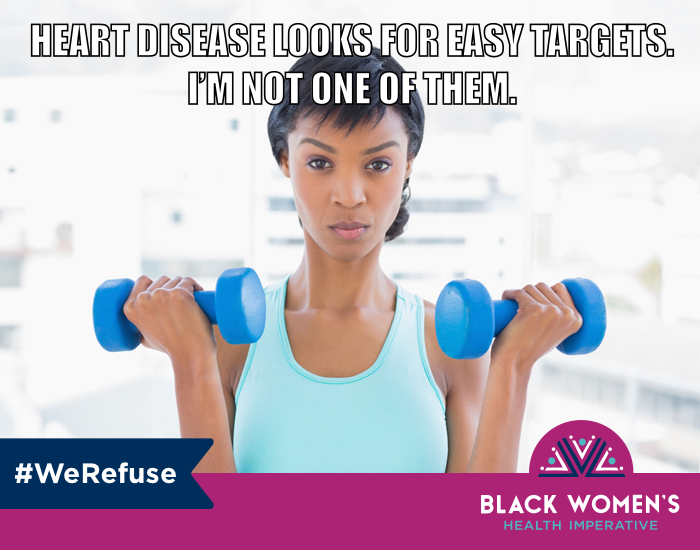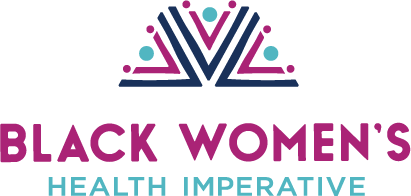This post was originally published in July 2017 and has been republished for Heart Health Month.
Here’s one simple question: Do you care about your health? Most people would answer, “Of course I do.”
Okay, so let’s assume you do. Then, here’s another question. Do you know that as a Black woman, you have a number-one health enemy, and it’s heart disease?
It’s so bad that you should wake up thinking about it. You should talk about it with every other woman you know. Because it’s killing us—right now.
As crazy as this might sound, heart disease is the leading cause of death for women in the U.S., but only about 1 in 3 Black women is aware of it. To make matters worse, this killer issue is more common in Black women than in women of other races.
Heart Disease In Black Women: Ring The Alarm
Heart disease is the number one cause of both death and disability in women in the U.S. As a Black woman, you have an even higher chance of dying from heart disease—and at a younger age—compared to white women, according to the National Heart, Lung, and Blood Institute.
How big of a problem is this? About 49% of African American women over age 20 have some type of heart disease, like:
- Clogged arteries in the heart, arms, or legs
- Stroke
- High blood pressure
- Angina (chest pain)
That means nearly 1 in every 2 Black women in the U.S. has heart disease.
Think about that for a second: If you’re sitting in a room with another Black woman, that means one of you might have some type of heart disease—and you don’t even know it.

The American Heart Association (AHA) reports that:
- Only 36% of African-American women are aware of the fact that heart disease is their biggest health risk.
- Only 20% of African-American women think they personally are at risk for heart disease.
Also, Black women are nearly twice as likely to have a stroke compared with white women, the AHA says.
When it comes to high blood pressure, African Americans—both men and women—are diagnosed more often than any other group in the world. And when you break down the numbers by gender, more Black women have high blood pressure than Black men: 46.3% compared to 45%.
Why Heart Disease Is Such A Big Issue For Black Women
There are several reasons why heart disease tends to be such a big issue for African Americans generally, and Black women specifically.
Some of the biggest risk factors for heart disease tend to be more common in African Americans than in people of other races, says the AHA. And to make matters more complicated, these risk factors are often health problems in their own right.
For example, diabetes, high cholesterol, and obesity increase a person’s risk of developing heart disease. And these are all issues that tend to be more common in African-Americans as well.
Genetics can play a role in a person’s risk level, too. According to the AHA, research suggests that a gene carried by many African Americans can make the body more sensitive to salt. This sensitivity can raise the risk of developing high blood pressure.
And, as with many health issues like diabetes and breast cancer, family history also matters. But it’s not as straightforward as saying, “My mom had heart disease, so I’ll have it eventually, too.”
This is because you can get heart disease from your genes, and sometimes you can also get it from picking up unhealthy habits from your parents, explains the U.S. Centers for Disease Control and Prevention (CDC).
So, if you’re frying vegetables in grease, or snacking on deep-fried french fries a few times a week, you might want to replace those habits with healthier ones. Try fresh, raw vegetables or baked potatoes. Your arteries will breathe a sigh of relief.
What You Can Do To Lower Your Risk Of Heart Disease
Fortunately, while the numbers and risk factors don’t paint the prettiest picture of heart health in Black women, there are lots of easy steps you can take to turn your risk around.
A good place to start is in the mirror. You and your everyday habits are the key to preventing heart disease. The CDC recommends adopting heart-healthy habits, such as:
- Making sure your diet includes lots of fruits, vegetables, and fiber
- Aiming for a diet low in sodium, sugar, saturated and trans fats, and cholesterol
- Staying active with 150 minutes of activity every week (walking, bike riding, etc.)
- Not smoking or using other tobacco products
- Limiting the amount of alcohol you drink
Finding out if heart disease runs in your family is another important step to take toward getting heart-healthy.
And, of course, talking to your doctor about your heart disease risk is always a good idea. Together, you can come up with an action plan to stop heart disease before it stops you.
About 2 out of every 3 Black women don’t know how big of an issue heart disease is. It’s time to change that. Spread the word by sharing this page with your friends and loved ones.
Change Your Lifestyle. Change Your Life. (CYL2), our yearlong evidence-based lifestyle change program gives you the tools and support you need to help prevent type 2 diabetes and other chronic conditions such as heart disease, high blood pressure, and high cholesterol. Learn more about CYL2 and our app to help you live a healthier lifestyle today!


